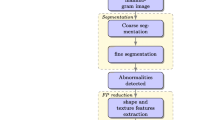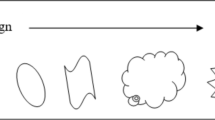Abstract
Current computer-aided detection (CAD) systems for mammography screening work as prompting devices that aim at drawing radiologists’ attention to suspicious regions. In this paper, we investigate utilizing a CAD system based on a support vector machine classifier as a standalone tool for recalling additional abnormal cases missed at screening, while keeping the associated recall rate at low levels. We tested the system on a large database of 5800 cases containing abnormal instances (1%) corresponding to prior examinations missed at screening. The results showed that 26% of the missed cases could be detected with a low additional recall rate of 2%. Moreover, after extrapolating this result to a screening program, we determined that, with our system, 0.73 additional cancers per 20 additional recalls could be potentially detected. We also compared the proposed system with a regular CAD system intended for non-standalone operation. The performance of the proposed system was significantly better.
Access this chapter
Tax calculation will be finalised at checkout
Purchases are for personal use only
Preview
Unable to display preview. Download preview PDF.
Similar content being viewed by others
References
van Dijck, J.A., Verbeek, A.L., Hendriks, J.H., Holland, R.: The Current Detectability of Breast Cancer in a Mammographic Screening Programme: A Review of the Prior Mammograms of Interval and Screen-Detected Cancers. Cancer 72, 1933–1938 (1993)
Warren Burhenne, L.J., et al.: Potential Contribution of Computer-Aided Detection to the Sensitivity of Screening Mammography. Radiology 215, 554–562 (2000)
Otten, J.D.M., et al.: Effect of Recall Rate on Earlier Screen Detection of Breast Cancers Based on the Dutch Performance Indicators. J. Natl. Cancer I. 97, 748–754 (2005)
Rao, V.M., Levin, D.C., Parker, L., Cavanaugh, B., Frangos, A.J., Sunshine, J.H.: How Widely is Computer-Aided Detection Used in Screening and Diagnostic Mammography? J. Am. Coll. Radiol. 7, 802–805 (2010)
Karssemeijer, N., et al.: Breast Cancer Screening Results 5 Years after Introduction of Digital Mammography in a Population-Based Screening Program. Radiology 253, 353–358 (2009)
Karssemeijer, N.: Automated Classification of Parenchymal Patterns in Mammograms. Phys. Med. Biol. 43, 365–378 (1998)
Karssemeijer, N., te Brake, G.M.: Detection of Stellate Distortions in Mammograms. IEEE T. Med. Imaging 15, 611–619 (1996)
te Brake, G.M., Karssemeijer, N.: Single and Multiscale Detection of Masses in Digital Mammograms. IEEE T. Med. Imaging 18, 628–639 (1999)
Timp, S., Karssemeijer, N.: A New 2D Segmentation Method Based on Dynamic Programming Applied to Computer Aided Detection in Mammography. Med. Phys. 31, 958–971 (2004)
Cortes, C., Vapnik, V.: Support-Vector Networks. Mach. Learn. 20, 273–297 (1995)
Lesniak, J., et al.: Computer Aided Detection of Breast Masses in Mammography using Support Vector Machine Classification. In: Proc. SPIE, vol. 7963 (2011)
Samuelson, F.W., Petrick, N., Paquerault, S.: Advantages and Examples of Resampling for CAD Evaluation. In: Proc. IEEE Int. Symp. Biomed. Imag., pp. 492–495 (2007)
Hupse, R., Karssemeijer, N.: Use of Normal Tissue Context in Computer-Aided Detection of Masses in Mammograms. IEEE T. Med. Imaging 28, 2033–2041 (2009)
Author information
Authors and Affiliations
Editor information
Editors and Affiliations
Rights and permissions
Copyright information
© 2012 Springer-Verlag Berlin Heidelberg
About this paper
Cite this paper
Melendez, J., Sánchez, C.I., Hupse, R., van Ginneken, B., Karssemeijer, N. (2012). Potential of a Standalone Computer-Aided Detection System for Breast Cancer Detection in Screening Mammography. In: Maidment, A.D.A., Bakic, P.R., Gavenonis, S. (eds) Breast Imaging. IWDM 2012. Lecture Notes in Computer Science, vol 7361. Springer, Berlin, Heidelberg. https://doi.org/10.1007/978-3-642-31271-7_88
Download citation
DOI: https://doi.org/10.1007/978-3-642-31271-7_88
Publisher Name: Springer, Berlin, Heidelberg
Print ISBN: 978-3-642-31270-0
Online ISBN: 978-3-642-31271-7
eBook Packages: Computer ScienceComputer Science (R0)




